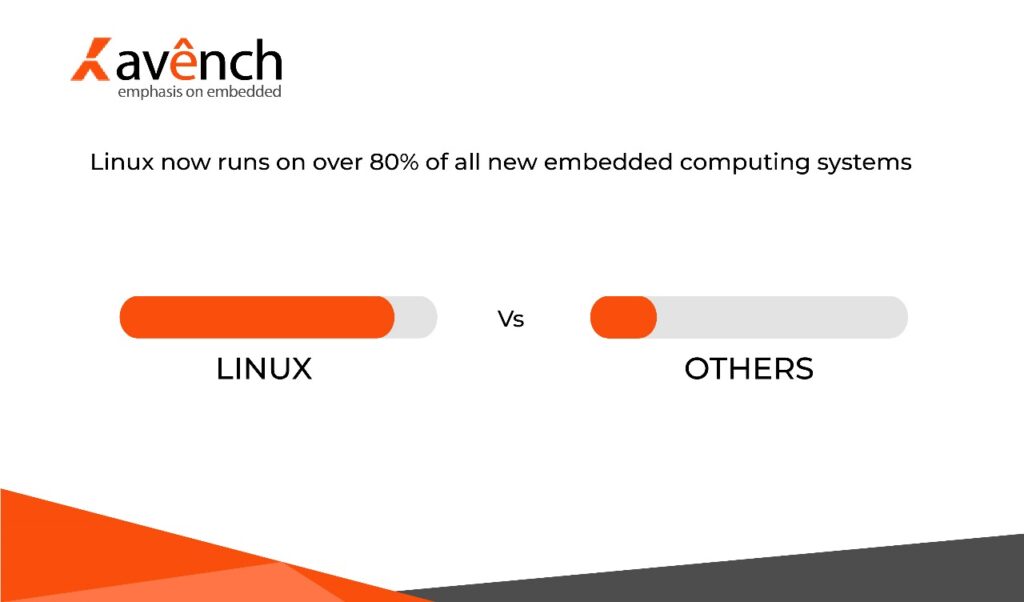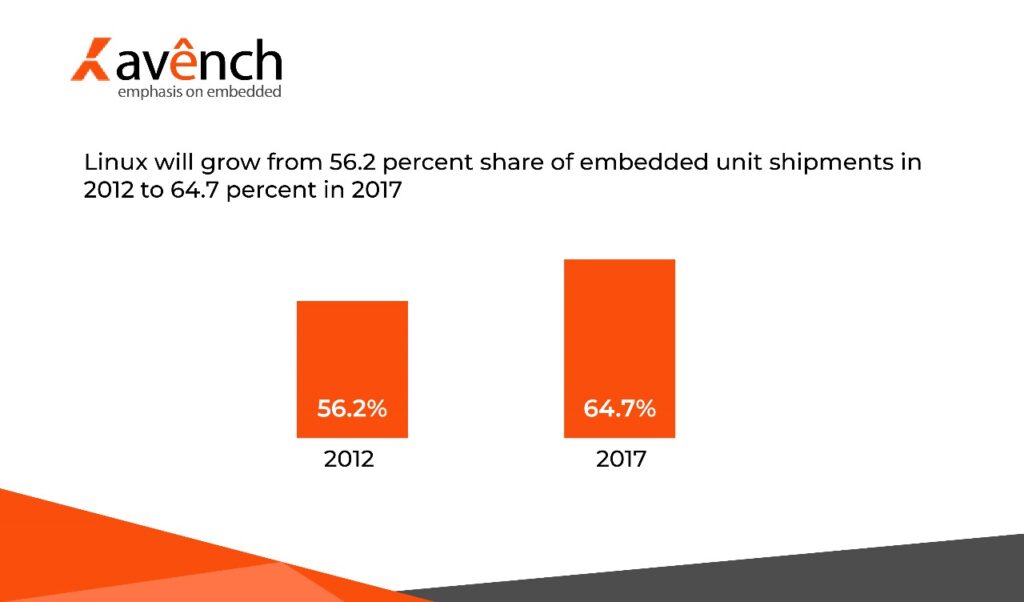This blog delves into how embedded Linux is revolutionizing the Internet of Things (IoT) industry, detailing the devices that use embedded Linux, the importance of custom embedded Linux solutions, security considerations, and how Avench enables and enhances Embedded Linux implementations.
Why Embedded Linux is Revolutionizing the IoT Industry
Embedded Linux has long been a pivotal player in the world of embedded systems, driving a multitude of devices from simple gadgets to complex industrial machines. The adaptability and robustness of embedded Linux make it a top choice for developing reliable, high-performance embedded applications. This blog delves into how embedded Linux is revolutionizing the Internet of Things (IoT) industry, detailing the devices that use embedded Linux, the importance of custom embedded Linux solutions, security considerations, and how Avench enables and enhances Embedded Linux implementations.
This blog delves into how embedded Linux is revolutionizing the Internet of Things (IoT) industry, detailing the devices that use embedded Linux, the importance of custom embedded Linux solutions, security considerations, and how Avench enables and enhances Embedded Linux implementations.
Embedded Linux and Its Impact on IoT
Embedded Linux, a scaled-down version of the Linux operating system, is specifically designed for embedded devices. It offers a lightweight, efficient, and flexible platform that can be tailored to meet the unique demands of various IoT applications. The flexibility of embedded Linux lies in its open-source nature, allowing developers to customize and optimize the OS to suit specific hardware and application requirements.
One of the primary reasons for embedded Linux’s popularity in the IoT space is its ability to support a wide range of devices. From smart home appliances to industrial automation systems, embedded Linux can be found at the heart of countless IoT solutions. Its scalability allows developers to create custom embedded Linux systems that cater to both low-power, resource-constrained devices and high-performance applications.

Devices That Use Embedded Linux
A wide array of devices leverage embedded Linux for their operation, showcasing its versatility and broad applicability. Some prominent examples include:
Smart Home Devices: Embedded Linux powers various smart home appliances such as smart thermostats, security cameras, and home automation systems. These devices benefit from Linux’s ability to handle complex tasks efficiently while ensuring low power consumption.
Industrial Automation: In the industrial sector, embedded Linux is used in PLCs (Programmable Logic Controllers), HMIs (Human-Machine Interfaces), and robotics. The reliability and real-time capabilities of embedded Linux make it an ideal choice for critical industrial applications.
Automotive Systems: Modern vehicles incorporate embedded Linux for infotainment systems, navigation, and advanced driver-assistance systems (ADAS). The flexibility of embedded Linux allows automotive manufacturers to integrate a variety of functions while maintaining system stability.
Healthcare Devices: Medical devices such as patient monitors, diagnostic equipment, and portable medical devices use embedded Linux to ensure accurate data processing and real-time monitoring, critical for patient safety and effective healthcare delivery.
Consumer Electronics: Smartphones, tablets, and wearables are prime examples of consumer electronics that utilize embedded Linux. The OS provides a stable and secure platform for these devices, enabling seamless user experiences.
Custom Embedded Linux
Creating custom embedded Linux solutions is essential for optimizing performance and functionality for specific applications. Custom embedded Linux allows developers to strip down the OS to its core components, removing unnecessary features to enhance efficiency and reduce system footprint. This customization ensures that the embedded system operates at peak performance, tailored precisely to the hardware it runs on.
Custom embedded Linux solutions also provide the opportunity to implement proprietary features and optimizations. This is particularly important for companies looking to differentiate their products in a competitive market. By customizing the OS, developers can add unique functionalities that set their devices apart from the competition.
Moreover, custom embedded Linux enables better integration with specific hardware components. By tailoring the OS to the hardware, developers can ensure optimal communication between the software and the hardware, leading to improved overall system performance and reliability.

Embedded Linux Security
Security is a critical consideration in the deployment of embedded Linux in IoT devices. As these devices often operate in sensitive environments and handle critical data, ensuring robust security measures is paramount. Embedded Linux security involves multiple layers of protection to safeguard against potential threats and vulnerabilities.
Secure Boot: Secure boot ensures that only trusted software is executed on the device. This prevents unauthorized code from running, protecting the device from malware and other malicious attacks.
Access Controls: Implementing strict access controls is essential for preventing unauthorized access to the system. By defining user roles and permissions, embedded Linux systems can restrict access to sensitive data and functions.
Encryption: Data encryption is crucial for protecting information both at rest and in transit. Embedded Linux supports various encryption standards to secure sensitive data, ensuring that it remains confidential and tamper-proof.
Regular Updates and Patching: Keeping the OS and applications up to date with the latest security patches is vital for mitigating vulnerabilities. Embedded Linux systems should have mechanisms in place to receive and apply updates regularly.
Intrusion Detection: Implementing intrusion detection systems helps monitor the system for unusual activity and potential security breaches. By identifying and responding to threats in real-time, embedded Linux systems can maintain their integrity and security.
How Avench Enables Embedded Linux
Avench is at the forefront of enabling and enhancing embedded Linux implementations, providing tailored solutions that meet the specific needs of diverse industries. Avench’s expertise in embedded systems and deep understanding of Linux allows them to deliver high-quality, custom embedded Linux solutions that drive innovation and efficiency.
Customized OS Development: Avench specializes in developing custom embedded Linux distributions tailored to the unique requirements of each client. By optimizing the OS for specific hardware and applications, Avench ensures that the embedded systems operate efficiently and reliably.
Security Enhancements: Avench prioritizes security in all its embedded Linux solutions. Their team implements robust security measures, including secure boot, access controls, encryption, and regular updates, to protect devices from potential threats.
Performance Optimization: Avench focuses on optimizing the performance of embedded Linux systems. By fine-tuning the OS and leveraging advanced techniques, they ensure that devices run smoothly, even in resource-constrained environments.
Integration and Support: Avench provides comprehensive support for integrating embedded Linux into various devices. Their team assists clients throughout the development process, from initial design to deployment, ensuring seamless integration and long-term support.
Innovative Solutions: Avench stays ahead of the curve by continuously exploring new technologies and methodologies. Their commitment to innovation ensures that clients receive cutting-edge solutions that address emerging challenges and drive success.For many companies, the embedded software development lifecycle doesn’t end at deployment.
Conclusion:
Embedded Linux is undeniably a game-changer in the IoT industry. Its versatility, reliability, and scalability make it an ideal choice for a wide range of devices and applications. The ability to create custom embedded Linux solutions further enhances its appeal, allowing developers to optimize performance and add unique features.
Security remains a top priority in the deployment of embedded Linux, with multiple layers of protection ensuring the integrity and confidentiality of data. Companies like Avench play a crucial role in enabling and enhancing embedded Linux implementations, providing customized solutions, security enhancements, and ongoing support to meet the evolving needs of the industry.
As the IoT landscape continues to expand, embedded Linux will undoubtedly remain at the forefront, driving innovation and transforming how devices interact and perform. With its robust capabilities and the expertise of industry leaders like Avench, embedded Linux is set to continue revolutionizing the IoT industry for years to come.
Avench is one of the leading embedded companies in bangalore, to know more information for any sales queries, wait for no further contact us at +1 (775) 404-5757. You can also email us at sales@avench.com, or fill the query form in a website.

